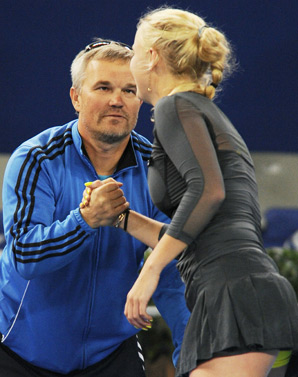Enduring 'tennis dads' continue to make trouble for their offspring
One thing hasn't changed over the years. The dreaded "tennis dad" still roams the earth, arrogant to the extreme and wielding entirely too much power.
Perhaps none of today's violators make the Overbearing Hall of Fame, featuring the likes of Stefano Capriati, Jim Pierce, Roland Jaeger, Marinko Lucic and that most dastardly character of them all, Damir Dokic. But the sport remains tarnished by sideshows, parents making the regrettable mistake of living their lives through their children's stardom.
Caroline Wozniacki is a delightful young woman with formidable talent and, until recently, the honor of being ranked No. 1 in the world. There's no question that the influence of her father, Piotr, was crucial to her development -- but it seems the man can't stay out of his own way.
In August of last year, after a disheartening loss to Christina McHale in Cincinnati, Caroline announced that she and her father had ended their coaching relationship. He was heard yelling at her during the match, and reports suggested that both were at wit's end. "As you can see, she cannot win matches right now," Piotr told a Danish newspaper, "because she does not know how she should play."
The identity of her new coach was a mystery (at least to outsiders) for several weeks, and it wasn't until December that Ricardo Sanchez, a Spanish coach who had worked with Jelena Jankovic, officially joined the Wozniacki team.
The arrangement lasted two months. Sanchez learned that he'd be little more than a pawn in this game, offering tidbits of advice while Piotr called the shots.
"They have their own system, and they work so well together, it is impossible to break the ice and penetrate," Sanchez said. "I could not continue to work under Piotr's system, and Caroline just got confused. It's impossible with two coaches who want something different."
Most every critic has isolated the weakness in Wozniacki's game -- an inability to match power strokes with the likes of Victoria Azarenka, Petra Kvitova and Maria Sharapova -- but there has been no evidence of change.
"She should improve, she must be more aggressive," Sanchez told a Spanish newspaper. "She should be a race horse and not a burden. I tried to do it, but they did not let me."
There's no telling where the story goes from here. Wozniacki, 21, is young enough to make significant improvements in her game.
But there will be no happy ending, apparently, in the saga of two French women and their bitter interactions with the establishment.
By all rights, the top two players on France's Fed Cup team should be Marion Bartoli, ranked No. 7 in the world, and Aravane Rezai, the flighty but exceptionally powerful 24-year-old who reached a career high of No. 15 in October 2010 and owns career wins over Sharapova, Wozniacki, Azarenka, Justine Henin and Venus Williams.
It seems that the father, in each case, forged a chasm that could not be repaired.
Walter Bartoli never had any intention of enlisting outside help, raising his daughter in relative secrecy with highly unconventional methods. His formula definitely worked -- Bartoli, for all her quirky on-court habits, is a much-feared player on the WTA Tour -- but it left the family with a rather nomadic existence in their home country. French captain Nicolas Escude has repeatedly left Bartoli off Fed Cup teams, saying her coaching situation made her "totally incompatible" with the team, and now he has ruled her out of Olympics consideration as well, a decision Marion described as "heartbreaking."
Two weeks ago, it was reported that Rezai was ticketed to represent France in the London Games, but that was before her latest dispute with French authorities. Rezai's career has long been overshadowed by a tempestuous relationship with her father, Arsalan, and his heated conflicts with the federation. She was left off the Fed Cup team that took a 3-2 loss to the Slovak Republic over the weekend, and there were conflicting reports as to whether she quit the squad or was given the boot. Escude told reporters that he had asked Rezai to leave Bratislava, the site of the matches, adding that she was "incoherent with reality."
Do these stories ever stop? In her forthcoming autobiography, Arantxa Sanchez Vicario writes that she has no relationship with her mother or father, claiming they "made me suffer a lot," that they took nearly all her of earnings, and that they opposed her marriage to her current husband, Jose Santacana.
"My parents left me with nothing," she told a Spanish magazine. "Now I am indebted [to the IRS] and I will not be quiet."
Then there's the ongoing saga of Bernard Tomic, the brilliant young Australian player, and his Croatian-born father, John. The kid's career has been pockmarked by controversy, invariably over his father's criticism of fellow players and Australian tennis authorities. During the recent Australian Open, when the 19-year-old Bernard got into a tense standoff with police over driving-related incidents, John accused the cops of being "un-Australian" and unfairly targeting his son.
If there's a single comment that speaks volumes, it came from a physical conditioner named Yutaka Nakamura, hired by the Tomic family two years ago to help reduce John's media profile. Nakamura had quite a résumé, having worked with Jim Pierce, Stefano Capriati and Yuri Sharapova, and he had also trained Jelena Dokic.
"I have experienced a lot of tennis parents," he told the Melbourne Herald Sun. "And, yes, they are a little pushy."





